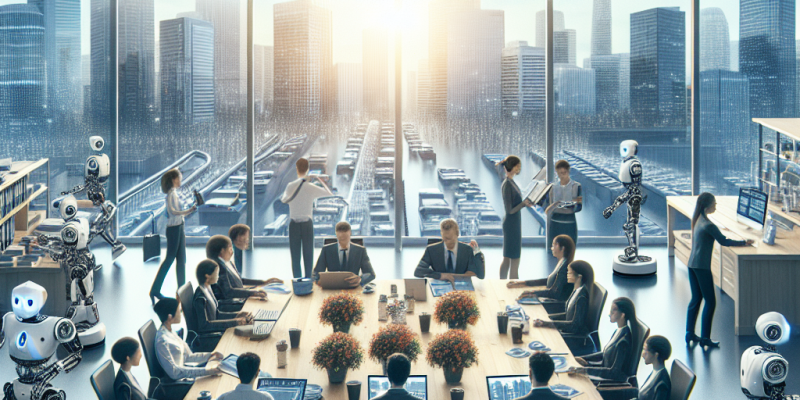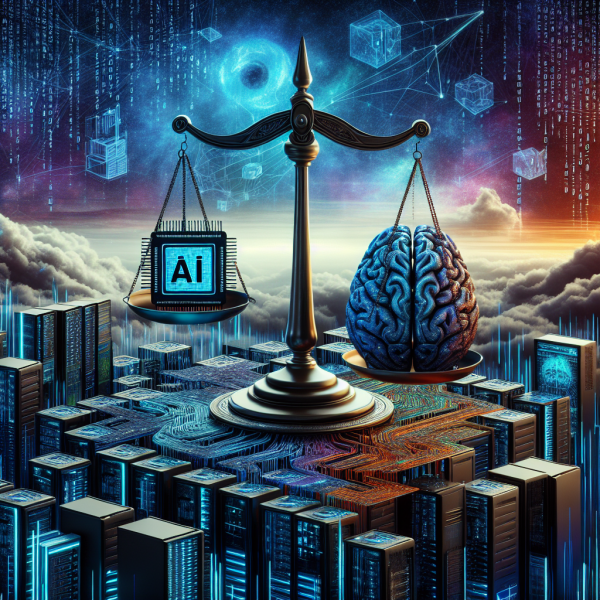Revolutionizing Efficiency: How AI-Powered Automation is Shaping Tomorrow’s Workforce

In the ever-evolving landscape of technology, few innovations have sparked as much excitement and debate as artificial intelligence (AI) and automation. Once confined to science fiction, these technologies are now at the forefront of organizational transformation, revolutionizing the way businesses operate and shaping the workforce of tomorrow. By enhancing efficiency, reducing operational costs, and enabling data-driven decision-making, AI-powered automation is not just a trend—it’s a fundamental shift in how work gets done.
The Rise of AI and Automation
The introduction of AI into the workplace marks a new era in industry dynamics. From chatbots facilitating customer service to machine learning algorithms optimizing supply chains, AI is being integrated across various sectors, fundamentally altering workflows. Automation, powered by AI, allows organizations to streamline repetitive tasks, enabling employees to focus on higher-value activities that require creativity, problem-solving, and strategic thinking.
Enhancing Efficiency Through Intelligent Automation
The efficiency gains from AI-powered automation are profound. For instance, in data entry and processing roles, AI can handle vast amounts of information more accurately and at a speed far surpassing human capabilities. This not only reduces the likelihood of errors but also frees up employees to engage in tasks that require critical thinking and interpersonal skills.
In manufacturing, predictive maintenance powered by AI can anticipate equipment failures before they happen, minimizing downtime and significantly cutting maintenance costs. Similarly, in the financial services industry, AI algorithms can instantly analyze the risk profiles of loan applicants, ensuring quicker decision-making while enhancing risk management.
Redefining Workforce Roles
As automation becomes more prevalent, the nature of work is changing. Some jobs may become obsolete, but many new roles are emerging that focus on managing and interpreting AI systems. Skills previously relegated to specialized roles are now becoming essential across the workforce. This shift necessitates reskilling and upskilling initiatives to prepare employees for a landscape in which human-AI collaboration is the norm.
For example, jobs in data analytics, AI system management, and human-machine interaction design are expected to see significant growth. Organizations must invest in training programs to ensure their workforce is not only equipped with technical skills but also proficient in areas like emotional intelligence and creativity, which machines cannot replicate.
The Role of AI in Driving Innovation
AI-powered automation is not just about efficiency; it’s also a catalyst for innovation. Businesses leveraging AI can analyze market trends, customer preferences, and operational performance in real-time, providing insights that drive strategic decisions. This capability allows companies to pivot quickly in response to emerging opportunities or challenges.
Moreover, through enhanced market research and product development processes empowered by AI, companies can tailor offerings to meet specific customer needs, minimizing time-to-market and ensuring greater competitiveness. As a result, businesses that integrate AI into their operations are not only improving efficiency but also unlocking avenues for sustaining innovation.
Ethical Considerations and the Future of Work
Despite the undeniable benefits, the rise of AI-powered automation presents ethical considerations that must be addressed. Concerns related to job displacement, data privacy, and algorithmic bias require a careful and responsible approach to implementation. Organizations must commit to transparency and ethical practices to foster trust among employees and consumers alike.
Moreover, navigating the transition towards an automated future will require collaboration between businesses, governments, and educational institutions. By working together, stakeholders can create frameworks and policies that support workers in adapting to new technologies while also ensuring that the societal impacts of automation are managed responsibly.
Conclusion
AI-powered automation represents a significant transformation in the modern workforce, one that offers tremendous potential for enhancing efficiency, driving innovation, and reshaping job roles. By embracing these technologies, organizations can position themselves for success in an increasingly competitive environment. However, with these advancements comes the responsibility to ensure that the workforce is equipped for the future and that ethical considerations guide the path forward. As we stand on the brink of this new era, a balanced approach will be essential in harnessing the full power of AI while championing human creativity and innovation.














